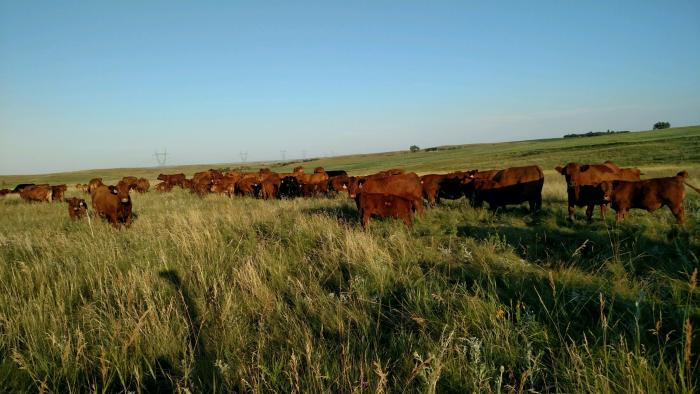Committed to Conservation in Oliver County
Raising and selling purebred Simmental cattle has been Wade and Merri Staigle family’s focus for the past 21 years. While selecting superior genetics has been important to that endeavor, so too has been their investment in conservation.
Kindra Gordon is writer from Whitewood, S.D.

Cross-fencing and adding water pipelines to get fresh water to pastures have been two areas they’ve been committed to, even on land they rent. They have added these features by working with the Natural Resources Conservation Service (NRCS) field office in Center, N.D., and it has allowed the Staigles to implement a rotational grazing system.
“It has made way more grass available to the cattle,” Wade says.
Many years they rotated cattle through pastures at least twice during the growing season. In wet years, they may rotate cattle through even a third time, while still leaving forage for the next season.
Val Hartman, NRCS District Conservation in Oliver County, has worked with the Staigles. “Wade and Merri have established a sustainable operation they can be proud of. Their commitment to improving the land, water quality and wildlife habitat, and leaving it better for the next generation is commendable and inspiring,” Hartman says.
Family endeavor
Wade and Merri returned full-time to Mandan Lake Simmental Ranch in 1997 and raised three sons, all of whom are still involved in the family cattle enterprise today. Daniel and Ethan and their young families work on the ranch and lease an adjoining ranch. Logan is employed off the ranch but continues to raise cattle with the family. They hold a bull sale in Mandan, N.D. each February.
Putting together this family operation of quality cattle and well-managed ranchland has been a labor of love for Wade and Merri. Wade grew up in the county and after attending college, worked on a commercial operation for a few years, before it dispersed during the difficult ag economy of the 1980s. He then purchased a cattle artificial insemination (AI) business in 1986 and ran it successfully for several years before being offered a district sales manager position with the cattle genetic company ABS in 1992.

In 1997, the Staigles had the opportunity to begin ranching full-time. “Ag was always my background, and I didn’t want to do anything else,” Wade says.
They purchased a cattle herd from an AI customer who didn’t have anyone returning to the ranch and added it to their existing herd.
Regarding his commitment to conservation, Wade credits that to his parents Charles and Janet Staigle, who are now retired, but still live on the family ranch.
“I don’t know anyone in the county who has planted more trees,” Wade says.
Working with the Oliver County NRCS Field Office, the Staigles have collaborated to create conservation plans for the ranch through the Environmental Quality Incentives Program (EQIP) and Conservation Stewardship Program (CSP).
“It takes quite a commitment,” he says, but worth the effort.
Wade’s initial interest was in cross-fencing and water development for rotational grazing. And he’s seen that benefit in his cattle.
“When we put fresh water in [via pipelines and tanks] it increased our weaning weights. I believe quality water is as important, if not more important, than grass.”
The Staigles also have re-seeded less productive farm ground back to grass for grazing or haying and have planted cover crops to enhance soil health on existing farm ground.
“We’ll plant oats early in the growing season for a hay crop,” Wade says. “Then, we plant a cover crop of turnips, radishes, millet, sorghum, and peas. This enhances soil health by breaking up any hardpan and adding nitrogen to the soil, and we can graze it later in the fall. It gives us a two-stage crop off the same land.”
And, true to his upbringing, Wade still invests in trees.
“We plant a lot of trees. We enjoy the protection they provide and the wildlife they bring to the ranch,” he says.

